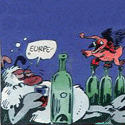|
canuckanese posted:Sort of, there was generally always a conservative party who wanted Rome to return to the old ways, and there were always people who were more liberal. There were never any true defined factions, but there were always distinct groups with opposing viewpoints, these usually centered around certain individuals with tons of charisma/clients. But that changed by the time the Eastern Roman Empire began to take off. Factions formed around chariot teams and the colors they represented, and had opinions about religion, citizenship, etc that always opposed. The blue-green divide caused the Nikea riots.
|
|
|
|

|
| # ? May 10, 2024 13:15 |
Xguard86 posted:one amusing thing: Caesar was kind of a hipster. There was a crowd of young Roman nobles who ran around together and created their own culture to mark their generation/clique. Honestly, the factions from when these guys were teenagers were a big part of what led the Republic to its downfall - Caesar and his "hipsters" largely ended up as populares, while Cato the Younger and his (mostly older) followers championed a uniquely Roman brand of conservatism. Cato the Younger was so called because he behaved and looked exactly like Cato the Elder, his great-grandfather; it'd be as though Abraham Lincoln or someone similar, seen as a moral father of the nation, was returning to life as this young man. Cato the Younger hated Julius Caesar from the beginning for being a LIEBERAL and essentially threatened to prosecute him every time he was about to leave government office; this was one of the factors that led him to march on Rome.
|
|
|
|
|
Augustus came to mean the emperor, whether one or two at a time. Caesar came to mean a junior emperor, or heir to the title of emperor.
|
|
|
|
Mister Gopher posted:But that changed by the time the Eastern Roman Empire began to take off. Factions formed around chariot teams and the colors they represented, and had opinions about religion, citizenship, etc that always opposed. The blue-green divide caused the Nikea riots. Holy poo poo, that makes Soccer hooliganism look like childs play.
|
|
|
|
Shimrra Jamaane posted:Holy poo poo, that makes Soccer hooliganism look like childs play. Speaking of soccer hooliganism, in the mid-1st century AD, a riot arose out of a gladitorial fight between Pompeii and Nuceria. The usual taunts you get at sports games were going about but it quickly grew into stones being thrown and swords being drawn so that scores of people were wounded. Nero was the emperor at the time and he banned Pompeii from having any games there for 10 years. I believe the people who organised the games were exiled. Of course they were able to hold the games again, but only for a decade owing to, you know, the eruption.
|
|
|
|
Shimrra Jamaane posted:Holy poo poo, that makes Soccer hooliganism look like childs play. Depends. There are Italian (of course) soccer clubs that have some loving crazy and destructive fan groups. And they are usually on the extreme ends of the political spectrum. Car bombs, riots, etc back in the 'Strategy of Tension' days
|
|
|
|
Mister Gopher posted:Depends. There are Italian (of course) soccer clubs that have some loving crazy and destructive fan groups. And they are usually on the extreme ends of the political spectrum. Car bombs, riots, etc back in the 'Strategy of Tension' days Thousands of people died in the Nika riots, much of Constantinople was burned down, and they attempted to overthrow the emperor. I don't think Serie A fans quite match that.
|
|
|
|
an skeleton posted:What is the difference between the title of "Augustus" and the title "Caesar?" Are they sort of interchangeable? I was blessed/cursed with Augustus as a middle name so this is pretty personal in a way, what are all the different meanings and such associated with that name? Augustus was an invented name from the Latin word for majestic or something along those lines. It was reserved for the emperor and meant you were super cool. Caesar means hairy, and as a title it was used for the designated successor when there was one. Later, in the tetrarchy the system was formalized briefly, the Augustus was the chief emperor of the east and the west, and the Caesar was the emperor in training who also ruled some territory. Augustus survived in modern languages as august, but Caesar remained a title for rulers for a long time. Kaiser and tsar are the most notable modern uses of it.
|
|
|
|
Isaac Asimov mentioned something interesting about the derivatives of the title "Caesar". common knowledge that a lot of other countries used derivatives of the name Caesar, e.g. the Russian Tsar or the German Kaiser. Well Julius Caesar was made dictator for life in 44 BC. The final ruler of a country named after Caesar was the Tsar of Bulgaria who was effectively deposed by the Russians in 1945 and officially in 1946 (I think), meaning that for almost exactly 2000 years there was a Caesar in charge somewhere. Obviously the Tsar of Bulgaria isn't really connected to Rome in any meaningful way, but I thought it was pretty interesting. It's
|
|
|
Grand Fromage posted:Britannia had valuable resources though. Even the Romans didn't just march on places that were totally worthless. And it's a long way away. Maybe if they'd conquered Germania and up through Denmark, they would've gone there. Minor expedition like in Hibernia and then split, I'd guess. It sounds like a bit of a joke, but I've been to at least one Italian place that still serves fried lamb brains. They're delicious. How much of modern Italian (and other) food comes from Roman food?
|
|
|
|
|
Grand Fromage posted:Augustus was an invented name from the Latin word for majestic or something along those lines. It was reserved for the emperor and meant you were super cool. Caesar means hairy, and as a title it was used for the designated successor when there was one. Later, in the tetrarchy the system was formalized briefly, the Augustus was the chief emperor of the east and the west, and the Caesar was the emperor in training who also ruled some territory. Actually, looking at google, the word augustus is the participle of a verb meaning to grow, lengthen, or extend, and the sense of praising was figurative. I wonder if that had any phallic connotations? Probably not, but it's pretty hilarious if Augustus basically meant Biggus Dickus.
|
|
|
|
icantfindaname posted:Actually, looking at google, the word augustus is the participle of a verb meaning to grow, lengthen, or extend, and the sense of praising was figurative. I wonder if that had any phallic connotations? Probably not, but it's pretty hilarious if Augustus basically meant Biggus Dickus. I haven't heard that usage of it, my understanding is it's fundamentally the same as august in English. Like an august figure, not the month (though Augustus is where that comes from). I do not know Latin though. Speaking of months, they're Roman. The original Roman calendar had ten months with a 60 day winter period that wasn't part of the year. This is why the four number named months are two months off now, like September -> sept -> seven, but is month nine now. It was originally seven when winter wasn't part of the calendar. January and February were added later to incorporate winter. January -> Janus. February -> Februa, a purification ritual done on February 15th. March -> Mars. This was originally the first month. April -> No one's actually sure what April comes from, it might've been an aspect of Venus. May -> Maia. June -> Juno. July -> Julius Caesar. August -> Augustus Caesar. September/October/November/December -> Month 7/8/9/10. July and August were originally Quintilis and Sextilis, month 5/6.
|
|
|
|
Grand Fromage posted:I haven't heard that usage of it, my understanding is it's fundamentally the same as august in English. Like an august figure, not the month (though Augustus is where that comes from). I do not know Latin though. I believe September (or was it October?) was briefly Domitianus too.
|
|
|
|
Grand Fromage posted:Speaking of months, they're Roman. The old Germanic calendar is so much better. October? Slaughter month. December? Fat sucking month. Finns also use non-Roman month names but they're very agrarian in comparison. Sow month, Summer month, Hay month, Harvest month...
|
|
|
|
Is there any more information on Ardaoneon/Portus Adurni than is on wikipedia? I'm reading through the info on notitia dignitatum and trying to find the specific page as it appears and the websites are...specialised.
|
|
|
|
Octy posted:I believe September (or was it October?) was briefly Domitianus too. I think Caligula changed September to "Germanicus" during his rule.
|
|
|
|
bean_shadow posted:I think Caligula changed September to "Germanicus" during his rule. Ah, then I think it must have been October for Domitianus as that was the month Domitian was born.
|
|
|
|
So France, Iberia and Romania became Latin-speaking during the Roman rule. Is there any information on why these regions adopted Latin culture and language, and not, for example, North Africa? Were the Romans actively colonizing these areas? I know that civilized Romans were expected to know both Latin and Greek, but was there any kind of offcial language policy in the Empire? What kind of relationship and attitudes did the Romans have with local languages?
|
|
|
|
North Africa's Latin roots got wiped out by the Arab conquests. The east was always primarily Greek speaking, and much of that also got taken over by Arabs or Turks so the Greek was lost. The Balkans remained Romanized until the Slavs moved in, and they didn't adopt the existing culture. There was no official language, just de facto like English in the United States. The Romans don't appear to have forcibly wiped out languages, so they would've survived among the conquered peoples, but if you wanted to get anywhere in the world you needed to learn Latin. That process gradually killed off the original languages. A good example I know offhand is Etruscan, the Etruscans were under Roman domination for a solid four centuries or so before their language dies out. Grand Fromage fucked around with this message at 16:08 on Jun 23, 2012 |
|
|
|
That is one of the cool things of the Vindolanda tablets: it shows "normal" people speaking and writing Latin in one of the farthest outposts of the empire. Well I guess we just assume they were speaking it since they were writing it. I guess that is not a completely safe assumption.
|
|
|
|
Grand Fromage posted:North Africa's Latin roots got wiped out by the Arab conquests. The Berber and Coptic languages survived though, which suggests that Roman cultural penetration was somewhat shallow.
|
|
|
|
Ras Het posted:The Berber and Coptic languages survived though, which suggests that Roman cultural penetration was somewhat shallow. Both special cases. The Berber tribes were never integrated into Roman society to any extent, and Egypt always kept its native culture. If there had been no Arab conquests I have no doubt that North Africa would be speaking Romance languages.
|
|
|
|
Mister Gopher posted:Depends. There are Italian (of course) soccer clubs that have some loving crazy and destructive fan groups. And they are usually on the extreme ends of the political spectrum. Car bombs, riots, etc back in the 'Strategy of Tension' days A true Roman blushing here. Comprando un petardo, ho pensato a te, Romanista bastardo...might be older than I thought....
|
|
|
|
Ultras Lazio posted:A true Roman blushing here.  (vaffanculo) Grand Fromage posted:Both special cases. The Berber tribes were never integrated into Roman society to any extent, and Egypt always kept its native culture. If there had been no Arab conquests I have no doubt that North Africa would be speaking Romance languages. Ah, fair enough.
|
|
|
|
That bridge from the last page is awesome, Magna Caseum. Can you think of any other examples of still-in-use roman buildings/infrastructure? I remember poring through some 60s-era National Geographic and there was a shot of some Italian shepherd driving his flock along a Roman road. That was pretty cool.
|
|
|
|
I saw this story in the news today and thought it was pretty interesting: http://news.yahoo.com/roman-jewellery-found-ancient-japan-tomb-163550978.html quote:Glass jewellery believed to have been made by Roman craftsmen has been found in an ancient tomb in Japan, researchers said Friday, in a sign the empire's influence may have reached the edge of Asia.
|
|
|
|
Grand Prize Winner posted:That bridge from the last page is awesome, Magna Caseum. Can you think of any other examples of still-in-use roman buildings/infrastructure? There are many ancient temples still in use. Rome's Pantheon is a fine example, it was built at the time of Augustus as temple to all gods but nowadays it serves as a Catholic church and also as tomb of king Vittorio Emanuele II. Hagia Sophia was built as an Orthodox temple after which Turks converted it into a mosque and added minarets; nowadays it's a museum and some of the original mosaics have been restored.
|
|
|
|
Nenonen posted:There are many ancient temples still in use. Rome's Pantheon is a fine example, it was built at the time of Augustus as temple to all gods but nowadays it serves as a Catholic church and also as tomb of king Vittorio Emanuele II. Hagia Sophia was built as an Orthodox temple after which Turks converted it into a mosque and added minarets; nowadays it's a museum and some of the original mosaics have been restored. Where did the Ecumenical Patriarch move to after the fall on Constantinople?
|
|
|
|
Iseeyouseemeseeyou posted:Where did the Ecumenical Patriarch move to after the fall on Constantinople? He stayed in the city. At the time, there was a massive split in the Greek Orthodox Church over an ill-fated attempt to re-unite the Orthodox and Roman Catholic Churches, and the existing Patriarch Gregory Mammas, who supported the project, had been forced to flee to Rome in 1451 and effectively abdicated. Sultan Mehmet simply had the surviving bishops elect a new Patriarch, Gennadius, after the fall of the city. Mehmet had an interest in having a Patriarch in place because he wanted someone to, in effect, act as the leader of his new Greek subjects and that was what the Patriarchs did throughout the period of Turkish rule. Initially, the Patriarch's new headquarters was the Pammacaristos church.
|
|
|
|
Gregory Mammas had a successor who was Patriarch for 3 years, Athanasius II. He fled to Mount Athos after the fall and died in 1459.
|
|
|
|
Foolhorn posted:I saw this story in the news today and thought it was pretty interesting: That's cool. I always wondered if we'd find something in Japan. It probably wasn't traded directly, but got there by way of China, either directly China -> Japan or China -> Korea -> Japan. Grand Prize Winner posted:That bridge from the last page is awesome, Magna Caseum. Can you think of any other examples of still-in-use roman buildings/infrastructure? Some of the Roman sewers in Rome are still used. An aqueduct or three as well, though I'm not sure if they're in Rome or another city. Hadrian's Mausoleum is now known as the Castel Sant'Angelo, it was a retreat for the Popes. The bridge directly in front of it is called the Pons Aelius, built by Hadrian and still used. Like Nenonen said, there are a number of churches that were Roman temples or basilicas originally.
|
|
|
|
Grand Prize Winner posted:That bridge from the last page is awesome, Magna Caseum. Can you think of any other examples of still-in-use roman buildings/infrastructure? http://en.wikipedia.org/wiki/Almu%F1%E9car quote:For this the Romans built in the 1st century AD four miles of water conduit in the valleys of the Rio Seco and the Rio Verde including five significant aqueducts. All, remarkably, are still standing and four of them are still in use after 2,000 years - adapted by the Moors over the centuries to serve the needs of crop irrigation. The Roman water supply also served the town and recent excavations in the town centre have uncovered the fifth aqueduct and the Roman baths. The Maison Carrée in Nimes France. http://en.wikipedia.org/wiki/Maison_Carr%C3%A9e
|
|
|
|
drat I need to go to Nimes, these buildings are great. Honestly a Roman city 2,000 years ago probably wouldn't have looked much different than that from the air.
|
|
|
|
Grand Fromage posted:Hadrian's Mausoleum is now known as the Castel Sant'Angelo, it was a retreat for the Popes. I'm sort of curious if the Vatican has one or more treasure troves of history that they've been sitting on, perhaps obliviously, for however long it's been. Do you think there'd be much to learn about Rome (not to mention many other things) if the contents of the Vatican were thrown open to modern professional researchers? (This isn't a Vatican conspiracy theory question, I'm curious if there's legit archeological treasures gathering dust in the Pope's basement.)
|
|
|
|
Probably not more than any other museum. The Vatican's collection of Roman artifacts is gigantic and amazing. Old Popes destroyed a lot of stuff, as did the Patriarchs of Constantinople. The Vatican itself is built largely out of material mined from Roman buildings. The marble facing in St Peter's square was taken from the Colosseum, for example. One of the reasons so many Roman buildings were lost is people took material from them to build other stuff, it was a lot easier to mine metal/bricks/stone that was already cut and sitting there than to go get new material. The Vatican does employ real archaeologists and other researchers so I don't think it's any different than the British Museum or whatever.
|
|
|
|
We have all these examples, notably Cincinnatus, of Dictators leaving their post without attempting to stay in power with the implication that they could have stayed on if they really tried. How likely was it that your average Dictator could have actually tried to become monarch? Cincinnatus' story seems really much more like a morality play, especially considering the lack of primary sources from his time. Dictator being an official office with term limits it does seem unlikely anyone, except maybe the extraordinarily popular like Camillus, would have been able to pull it off in the pre-Imperial days. I guess maybe that answers the question but I don't know the history in enough depth.
|
|
|
|
It would seem that any dictator who intended to stay on for a long time needed a sufficient power base of his own. Both Sulla and Caesar had that, in that their legions were for all practical purposes their own personal armies. In Cincinnatus' day, however, the legions were composed of citizen levies loyal to the Republic as a whole, not professional soldiers loyal to their general. Not that the above is sufficient explanation, but it's probably part of one. Alekanderu fucked around with this message at 20:13 on Jun 24, 2012 |
|
|
|
Can you post random stuff about the legions during the Principate? By the way, great thread. I read through everything up until now in anticipation of Rome 2 TW.
|
|
|
|
tables posted:Can you post random stuff about the legions during the Principate? They are going to make Rome II Total War?
|
|
|
|

|
| # ? May 10, 2024 13:15 |
|
DarkCrawler posted:They are going to make Rome II Total War? Googlage tells me it's still a rumor
|
|
|




































